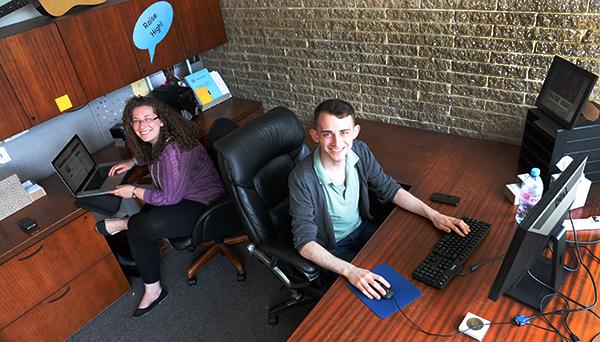
Meet GW’s top student advocates: Student Association President Nick Gumas and Executive Vice President Avra Bossov.
They will have the ears of top administrators next academic year, and are charged with acting as a bridge between the student body and the University.
Gumas and Bossov said they’ll spend the summer meeting with GW officials to create a plan for tackling the planks of their campaign platforms:
Peer-counseling program
Gumas started advocating for a stronger safety net for students struggling with mental health issues early in his campaign, but after three students committed suicide on the Mount Vernon Campus this semester, he said the need for better services is even more urgent.
His administration will aim to start a peer-counseling program on campus. He pointed to the University Counseling Center’s historically long waitlist for appointments, and said the new program would provide another option for students who need immediate attention.
While the program likely won’t launch by year’s end because of the time it would take to train student counselors, Gumas said he will make sure he leaves a foundation is in place.
Student engagement
With a newly reinstated diversity cabinet member, a job that Susuni split in two last year, improving multicultural and LGBT resources will remain a priority for Gumas, the former president of Allied in Pride.
Gumas and Bossov said they wanted the SA to not only connect students with administrators, but also direct them to the information they most need. They hope to launch a new SA website, which would list University services in one place and allow students to more easily engage with their leaders online.
“We want to change the way the student body interacts with the Student Association, so it’s not just the SA advocating for the student body but actively going to create platforms to connect the student body to resources to make students’ lives easier,” Gumas said.
Internship credit fees
SA leaders will also lobby the University to cut the cost that students pay for internship credits, which is the same as the cost of a class, coming in at about $4,000 for three credits.
Since employers usually require credit when an internship is unpaid, Gumas said it’s unfair for GW to charge a student when he or she is not making any money.
Last year’s leaders, Julia Susuni and Kostas Skordalos, set a high bar for Gumas and Bossov. With Susuni and Skordalos’ lobbying, the University agreed to a multi-million dollar move that will bring counseling and health services to the center of campus.
Susuni said she had a successful year as the head of the SA because she devoted her energy to a small set of goals.
“It’s really important for you as a student leader to focus on the things you think are important but also make sure you have structures in place so you are able to tackle things not necessarily on your list of priorities but that need to be addressed,” she said.





